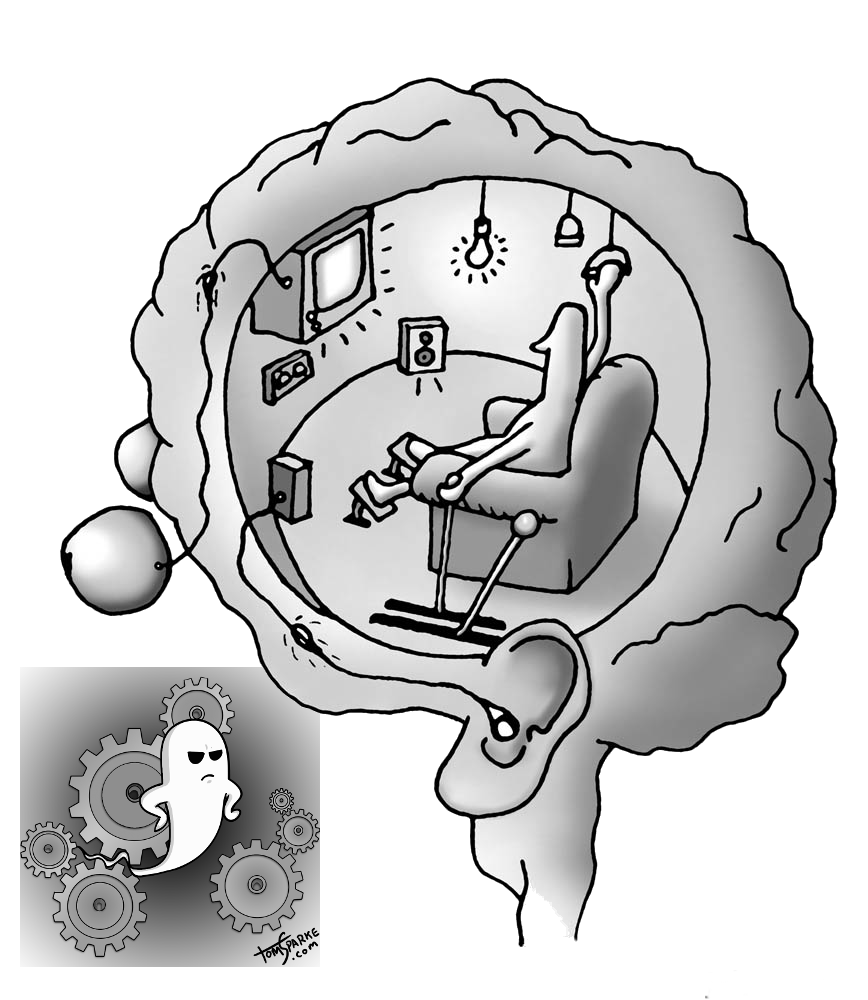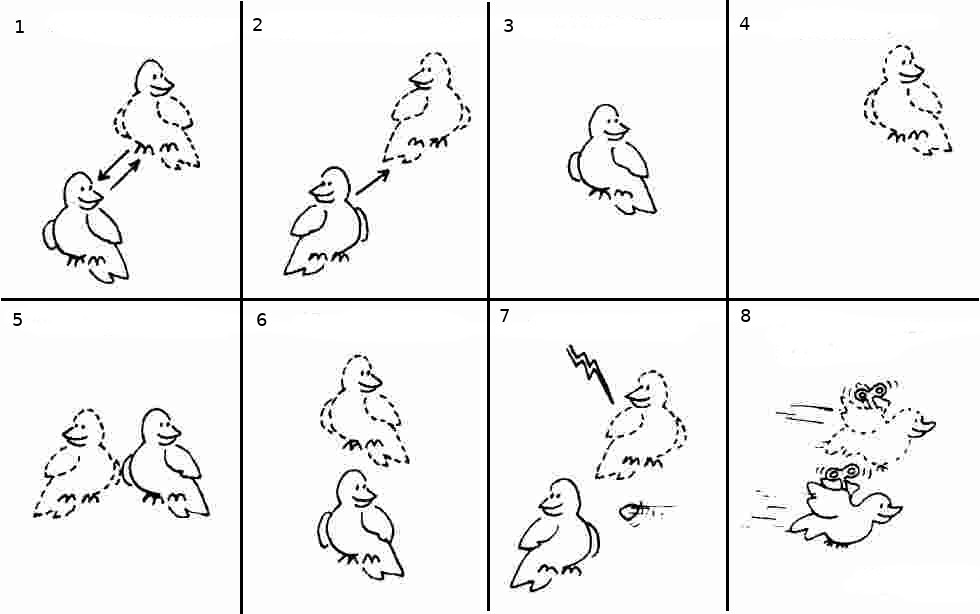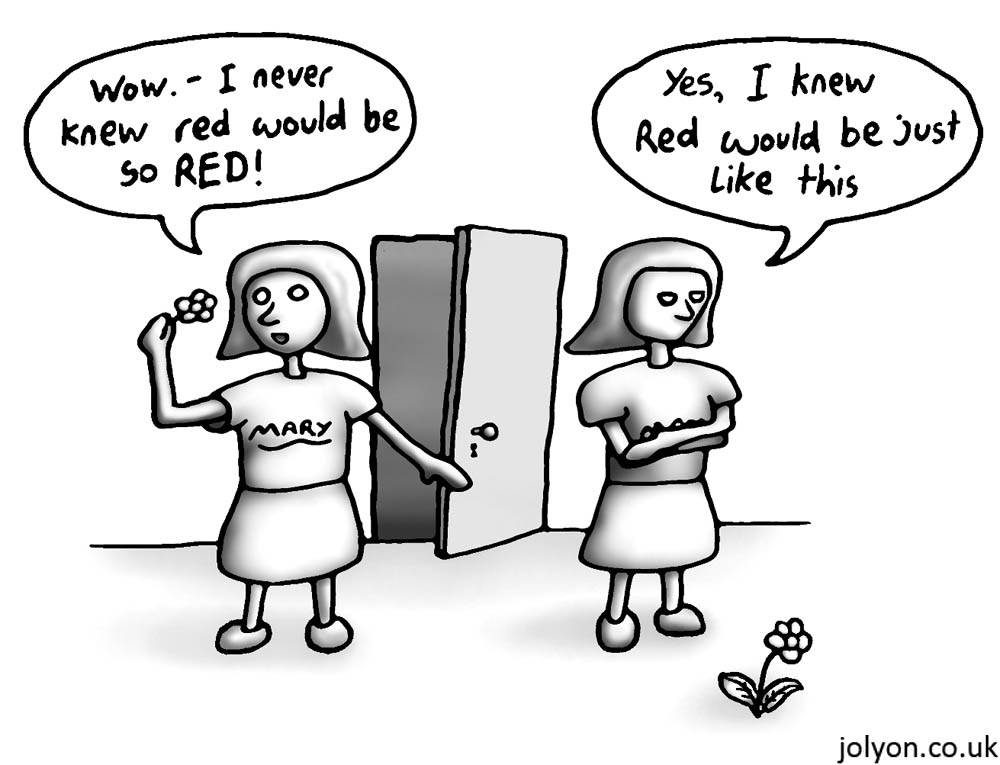2b Mind-Body Problem
Week: 13/05

Learning Objectives
Humans who engage in self-reflection always asked questions about the soul or the mind. Already ancient Greek philosophers tried to explore the these fundamental questions, which is basically a psychological question.
The mind-body problem is a philosophical debate concerning how the mind and body are connected. It’s a key issue in philosophy, psychology, and neuroscience. Are the mind and body separate entities? Or is there only a body or only a mind? Philosophy has been tackling these questions for centuries. While you may not aspire to be a philosopher, psychologists should be aware of the philosophy of the mind and the fundamental concepts proposed in this context.
- Piekkola (2017)
- Chapter 2: Historical Conceptual Issues
- Chapter 6: The Mind Body Problems
Tutorial Meeting
Question 1
If you look at the picture above which notion of the philosopher Gilbert Ryle: “the dogma of the Ghost in the Machine”. What do you think does he mean by that?
Question 2
Many old ideas in the philosophy directly relate to the fundamental question of psychology about the mind. The philosophers were particularly interested in the relation between mind and body.
Before you start discussing possible solutions to the mind-body problem, it might be good to define the problem. What is exactly the mind-body problem?
Question 3
What are the main ideas of cartesian dualism (as proposed by René Descartes). In your view, how did it influenced the study of psychology and affected thus our disciple?
Question 4
Categorize the different views on the mind-body problem. Use the hierarchical structure below. You can add as many lines and rectangles as necessary. Explain your decisions and elaborate on the different views and provide keywords.

Question 5
Have another look at the pictures and statements below. Which views on the mind-body problem belongs to the notions and pictures and why?
| Notion | |
|---|---|
| A | “God ensures that the body and mind work together in all things.” |
| B | “The mind exists independently from the body.” |
| C | “There is a close links between the body and the mind.” |
| D | “Your behaviour is only governed by your brain! There is no mind.” |
| E | “We can understand the mind to be a side effect of the body.” |
| F | “The mind and the body are two sides of the same coin.” |
| G | “Everything we experience physically, is no more than an illusion of our mind.” |
| H | “Mind and body act in synchronous.” |

Question 6
Some philosophers criticized that ‘the official doctrine’ of dualism or argued that the entire question of mind-body is problematic. What are these critiques?
Discussion 1
We discussed various views on the mind body problem. Which of the positions on the mind-body problem do you prefer? What are the consequences for psychology?
Discussion 2
‘Mary’s room’ by Frank Jackson (1982; 1986) is a famous thought experiment related to the mind body problem. In this thought experiment we are asked to imagine a scientist, named Mary, who has lived her entire live in a room with no colors. She learns everything there is to physically know about colors, but never really experiences these colors.

The question is asked whether Mary would learn something new when she leaves the room and enters the colored world. Jackson argues that Mary would learn something new, being what it’s like to experience color (qualia). This thought experiment can be considered a problem for most materialistic views. Explain why.
Discussion 3
Some materialist views such as the identity theory claims things like:
- Mental states are functional states and merely the result of what has changed in the body/environment.
- Mental states are pattern of activation (of neurons).
If these statements are correct, doesn’t it mean that robots could also have mental states (emotions). Their activation pattern is just on a silicon chip and not in an neuronal network.
Do you agree with the claims? And what do you think about this view?
Can robots fall in love?

Study Checklist
- Basic philosophical concepts
- Ontology & epistemology
- Rationalism versus empiricism
- Reductionism
- Appearance versus reality
- The mind–body problem
- Descartes’ interactionism
- Occasionalism
- Double Aspect Theory
- Psychophysical parallelism
- Leibniz: pre-established harmony
- Epiphenomenalism
- Idealism / Phenomenalism (lecture)
- Eliminative materialism
- Identity Theory
- Critique: John Dewey
- Qualia (lecture)
- Category mistake (lecture)